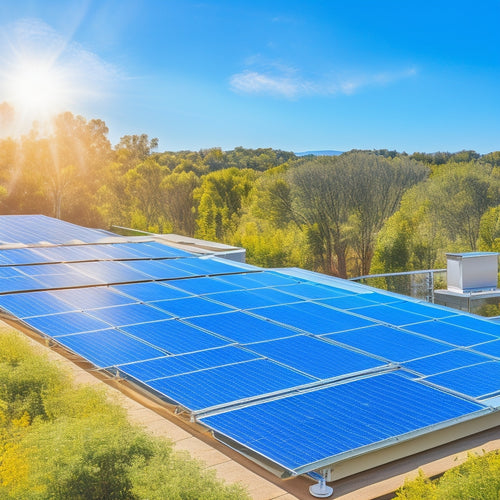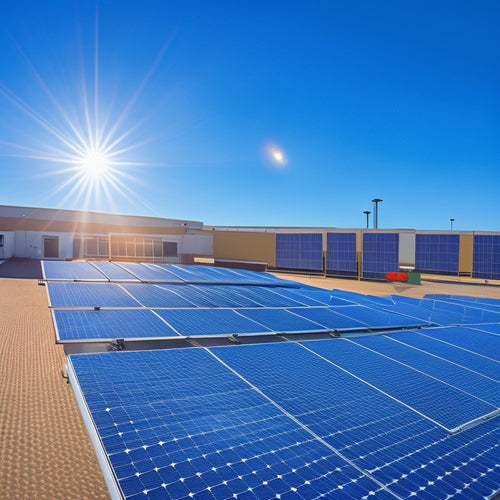
Off Grid Solar and Battery System
Share
When designing an off-grid solar and battery system, you need to guarantee that your battery bank is properly sized to meet your nighttime energy needs, as a reliable battery backup system is essential for maintaining power during grid outages and nightly energy demands. A well-designed system should maximize energy utilization, minimizing waste during peak sun hours and optimizing energy independence at night. To achieve this, you'll need to assess your daily power needs, choose the right deep cycle battery type, and confirm your system can handle peak power demands. By getting these factors right, you'll be well on your way to energy independence, and there's more to investigate to guarantee your system runs efficiently and sustainably.
The Essentials
- Off-grid solar systems require reliable battery backup systems to ensure power during grid outages and nighttime energy security.
- Properly sized battery banks and efficient load balancing optimize energy independence and reduce grid dependence at night.
- Advanced energy monitoring and system optimization enhance overall energy efficiency, sustainability, and surplus energy harnessing.
- Deep cycle battery choice, maintenance, and monitoring significantly impact overall system performance, cost, and lifespan.
- Accurate energy assessment and system design ensure the off-grid solar and battery system meets daily energy requirements and peak power handling capacity.
Energy Independence at Night
You've installed your off-grid solar and battery system, but what happens when the sun sets and darkness falls?
You need a reliable source of power to get you through the night, and that's where your battery system comes in.
With a properly sized battery bank, you can enjoy nighttime energy security and power through the darkness.
Powering Through Darkness
The absence of sunlight during nighttime hours poses a significant challenge for off-grid solar systems, as the primary energy source is no longer available. You must rely on stored energy to power your home, which means your battery bank's performance is vital.
To guarantee a seamless shift from daytime to nighttime consumption, it's important to optimize your system's solar efficiency. This involves selecting high-efficiency solar panels that can capture as much energy as possible during the day. Additionally, having a reliable Backup Power Solutions guarantees that your home remains powered even when the grid is down. A well-designed battery backup system can provide peace of mind and protection from power outage-related issues.
When the sun sets, your battery bank takes over, providing the necessary power for nighttime consumption. The key is to strike a balance between your energy storage capacity and your nighttime energy needs.
By accurately evaluating your energy requirements, you can size your battery bank accordingly, guaranteeing you have enough power to get through the night. With a well-designed system, you can enjoy energy independence, even when the sun isn't shining.
Nighttime Energy Security
As darkness falls, your off-grid solar system's reliability is put to the test, and nighttime energy security becomes paramount.
You rely on your battery management system to guarantee a steady supply of power, optimized through efficient load balancing and system optimization. This allows you to maintain your energy independence, even when the sun isn't shining.
By leveraging Renewable Energy Storage, you can alleviate the burden of high energy bills and reduce grid dependence, providing you with greater energy independence and potential cost savings.
Your solar charging system, paired with advanced energy monitoring, tracks your nighttime consumption and adjusts accordingly. This intelligent approach prevents power outages and guarantees your batteries are always ready to meet your energy demands.
You're not reliant on a grid connection, freeing you from the constraints of traditional energy sources.
Zero Energy Wasted Daily
You're now able to leverage energy daily with maximum efficiency, thanks to advanced off-grid solar systems that guarantee every unit of energy is employed.
With the help of reliable off-grid solar inverters and battery storage systems, you can maximize your energy production and reduce waste.
This means you'll reap the full benefits of your solar panels, with no energy going to waste.
With a zero-loss guarantee, you can rest confident that your energy harvesting system is optimized for maximum daily energy production.
Daily Energy Harvesting
Daily, your off-grid solar and battery system generates a surplus of energy during peak sun hours, which can be wasted if not properly harnessed. To maximize energy harvesting, it's vital to optimize your system's performance. One way to do this is by improving solar panel efficiency. By employing high-efficiency panels, you can increase energy production during peak sun hours.
Energy conversion techniques also play an important role in maximizing energy harvesting. Your system's inverter and charge controller work together to convert DC power from your solar panels to AC power for your home. By selecting high-quality components with efficient conversion rates, you can minimize energy loss during this process.
Here's a breakdown of the daily energy harvesting process:
| Time of Day | Energy Generation | Energy Utilization |
|---|---|---|
| Peak Sun Hours | 500 Wh | 300 Wh |
| Partial Sun Hours | 200 Wh | 150 Wh |
| Low Sun Hours | 100 Wh | 50 Wh |
Zero Loss Guarantee
Your off-grid solar and battery system's Zero Loss Guarantee guarantees that every watt-hour of energy generated is employed, eliminating energy waste during peak sun hours. This means you can capitalize on the full potential of your solar technology, assuring maximum energy efficiency and minimizing your environmental impact.
With advanced battery innovations and power management systems, your off-grid lifestyle is supported by sustainable solutions that integrate seamlessly. You can enjoy the freedom of grid alternatives, knowing your renewable resources are being applied to their fullest extent.
The Zero Loss Guarantee assures that your system is optimized for performance, reducing waste and increasing overall efficiency. This means you can rely on your off-grid solar and battery system to provide a consistent and reliable source of power, even during periods of high demand.
Deep Cycle Battery Types
You'll need to evaluate two key factors when selecting a deep cycle battery type for your off-grid solar system: battery life expectancy and maintenance requirements.
When it comes to choosing the right battery, it's crucial to assess the type of renewable energy system you have, as some batteries are designed specifically for off-grid power solutions and others for energy storage systems.
The lifespan of your battery will greatly impact your system's overall performance and cost, while maintenance needs will affect your daily routine and budget.
Battery Life Expectancy
Determining the lifespan of deep cycle batteries is essential for off-grid solar systems, as it directly impacts the overall system's reliability and cost-effectiveness. You need to understand that battery life expectancy is influenced by several factors, including the type of battery, operating conditions, and charging cycles.
Deep cycle batteries, like the ones you're using, typically last between 5 to 15 years, with some lasting up to 20 years. However, this lifespan can vary greatly depending on the battery's quality, usage patterns, and environmental conditions.
Battery degradation occurs when the battery's capacity to hold a charge decreases over time. This degradation is accelerated by factors such as high temperatures, deep discharging, and improper charging.
You should expect your batteries to undergo around 3,000 to 5,000 charging cycles before they reach 80% capacity, which is considered the end of their lifespan. By understanding these factors, you can optimize your battery's performance, reduce maintenance costs, and guarantee a reliable off-grid solar system.
Maintenance Requirements
How frequently do deep cycle batteries need maintenance to confirm peak performance in off-grid solar systems?
As an off-grid solar system owner, you'll want to make certain your deep cycle batteries receive regular maintenance to optimize their lifespan and performance.
You should perform battery cleaning every 3-6 months to prevent corrosion buildup.
Schedule a system inspection every 6-12 months to identify potential issues before they become major problems.
Regularly monitor voltage levels to prevent overcharge or undercharge, which can greatly reduce battery life.
Check and tighten connections every 6 months to prevent loose connections from causing electrical resistance.
Additionally, perform electrolyte checks every 6-12 months and top off the electrolyte levels as needed.
Implement thermal management strategies to keep your batteries within the recommended temperature range.
Prevent corrosion by applying a corrosion-inhibiting coating to the terminals and connections.
Perform firmware updates as necessary, and conduct performance testing every 12-24 months to identify any potential issues.
Assess Your Daily Power Needs
You need to determine your daily energy usage to specify the capacity of your off-grid solar and battery system.
When designing your system, it's crucial to take into account the reliability of your energy storage, such as renewable energy battery systems, to guarantee you have a consistent power supply.
To do this, calculate your total watt-hour needs by identifying the appliances you'll use, their power ratings, and the number of hours you'll use them per day.
This assessment will help you size your system accurately, assuring you have enough power to meet your daily energy requirements.
Daily Energy Usage
By fully understanding your daily energy usage, you can accurately size your off-grid solar and battery system to meet your power needs. This understanding is essential in making sustainable lifestyle choices that align with your energy consumption patterns.
To assess your daily energy usage, you need to identify the appliances you'll be using and their corresponding power requirements. Here is a sample breakdown of your daily energy usage:
| Appliance | Power Requirement (Watts) |
|---|---|
| Refrigerator | 150 |
| Laptop | 65 |
| LED Light | 9 |
Total Watt-Hour Needs
In calculating your total watt-hour needs, it's vital to take into account the duration of appliance usage in addition to their power requirements. This involves multiplying the power rating of each appliance by the number of hours it will be used daily.
For instance, if you have a 10W LED light that will be used for 8 hours, its daily watt-hour requirement would be 80Wh.
After compiling the daily watt-hour requirements for all your appliances, you'll need to factor in the solar panel efficiency and energy conversion losses. A typical solar panel efficiency is around 20%, and energy conversion losses can range from 5-10%.
To guarantee you have a reliable off-grid system, it's vital to oversize your solar array and battery bank to account for these losses.
Higher Surge Tolerance Capacity
When selecting a solar and battery system, you'll need to take into account the peak power handling capacity of your components.
This is critical because it determines how well your system can handle sudden, high-power demands from appliances like refrigerators and air compressors.
You'll want to verify your system can handle these surges without compromising its overall performance or longevity.
Peak Power Handling
You need a solar and battery system that can handle peak power demands, especially during startup or brief high-power events. This is essential to guarantee your off-grid system can support the sudden surge in power required by appliances like refrigerators, air conditioners, and pumps.
A system that can't handle peak power demands may experience voltage drops, reduced battery efficiency, and even premature component failure.
To mitigate this, look for a system with a high surge tolerance capacity. This is typically measured regarding the system's ability to handle a certain level of power surge for a short duration, usually 10-30 seconds. A higher surge tolerance capacity guarantees your system can handle brief high-power events without compromising its performance or longevity.
When selecting a system, prioritize battery efficiency and surge protection. A high-efficiency battery will minimize energy losses during charging and discharging, while surge protection will safeguard your system from voltage spikes and electrical shocks.
Frequently Asked Questions
How Often Should I Clean My Solar Panels for Optimal Performance?
You should clean your solar panels every 6-12 months, depending on environmental conditions, to guarantee peak performance; employ gentle cleaning techniques, like soft brushes and deionized water, to avoid damaging the panels during solar panel maintenance.
Can I Use a Generator With My Off-Grid Solar System?
Coincidentally, you're considering backup power just like many homeowners. Yes, you can use a generator with your system, achieving hybrid collaboration through generator integration, which guarantees seamless power supply during low-sun periods or high-energy demands.
What Is the Average Lifespan of an Off-Grid Solar System?
You're wondering how long your investment will last; typically, a well-maintained system can run for 25-30 years, but you'll need to perform regular solar panel maintenance and plan for battery replacement every 10-15 years to guarantee peak performance.
Are Off-Grid Solar Systems Suitable for Areas With Frequent Power Outages?
You're seeking power reliability in areas prone to frequent outages, and you're wondering if certain systems can guarantee energy independence. Off-grid solar systems are a perfect fit, providing consistent power and freedom from grid reliance.
Can I Add More Solar Panels to My Existing Off-Grid System Later?
As you gaze out at your property, envisioning a future of energy independence, you wonder: can you expand your system's solar panel array later? Yes, you can increase your system capacity through solar panel expansion, seamlessly integrating new panels into your existing setup.
Final Thoughts
As you utilize the power of off-grid solar and battery systems, you're not just generating energy, you're building a safety net. Think of it like having a reservoir to collect and store rainwater - just as the reservoir buffers against drought, your battery system buffers against energy droughts. For instance, a 48V 400Ah deep cycle battery can provide 19.2 kWh of energy, enough to power a small household through a week-long grid outage. With the right system, you'll never be left in the dark.
Related Posts
-

What Types of Solar Energy Devices Are Available
You'll find several types of solar energy devices available today, each customized to different energy needs. Photovo...
-

Why Outdoor Solar Lighting Systems Are Sustainable
Outdoor solar lighting systems are sustainable because they utilize renewable energy, drastically reducing your carbo...
-

Essential Solar Panel Mounts for Commercial Properties
When it comes to essential solar panel mounts for your commercial property, durability and wind resistance are key fa...


